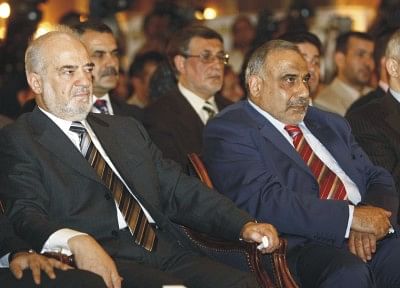Shia groups form new alliance sans Iraqi PM

Former Iraqi premier Ibrahim Jaafari (L) sits next to Iraqi Vice President Adel Abdel Mahdi prior to a press conference announcing a new political alliance yesterday in Baghdad, for January's general election which excludes allies of Prime Minister Nuri al-Maliki. Photo: AFP
Major Shia groups have formed a new alliance that will exclude the Iraqi prime minister, lawmakers said Monday, a move likely to stoke fears of increasing Iranian influence and shake up the political landscape ahead of January parliamentary elections.
The coalition will include the largest Shia party, the Iranian-backed Supreme Iraqi Islamic Council and anti-US cleric Muqtada al-Sadr's bloc, which could give Tehran deeper influence in Iraq just as US forces begin to withdraw.
The last American soldier is scheduled to leave Iraq by the end of 2011.
Prime Minister Nouri al-Maliki's Dawa Party was left out because of disagreement over who would lead the alliance, senior SIIC member Reda Jawad Taqi told The Associated Press. He said a last-minute meeting held Sunday in a bid to bring Dawa into the coalition had failed to overcome the differences.
Key figures in the alliance said efforts continued to try to reach agreement with Dawa.
"We are hoping for their participation and the door will be left open for them," ex-Prime Minister Ibrahim al-Jaafari said.
The announcement was a new setback for al-Maliki, whose efforts to portray himself as a champion of security has been battered by a series of devastating bombings in Baghdad and in northern Iraq in recent weeks. The most recent of these struck the foreign and finance ministries on Wednesday, killing about 100 people and wounding some 500.
The uptick in violence has heightened fears that Iraqi security forces aren't ready to protect the people nearly two months after most US troops pulled back from urban areas.
Iraqi Vice President Adel Abdul-Mahdi, a top SIIC member, also reached out to Dawa, saying it was important to present a strong united front that can face the overwhelming challenges facing the country.
"Forming the alliance is the first step and the second step will be broadening it and inviting political parties and national figures to join in order to achieve unity," he said.

 For all latest news, follow The Daily Star's Google News channel.
For all latest news, follow The Daily Star's Google News channel. 



Comments